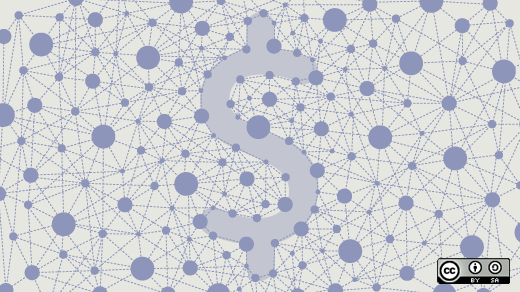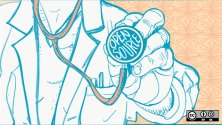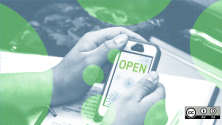MedStartr is a new way to fund healthcare initiatives—think Kickstarter for doctors, patients, and what ails them. It's headed up by Mike Pence and Alex Fair, two guys of different backgrounds and expertise who've come together to share the same dream and passion for helping those in physical need.
Mike Pence was Tech Lead at Kickstarter.com, is a Ruby on Rails guru, and together with Alex Fair, cofounded FairCareMD. Mike believes that we are all sympathetic to the advancement of medical science, whether currently healthy or stuggling with an illness or disease. Growing up in the 70s, his family had one of those great family doctors who saw them through many harrowing childhood illnesses, accidents, and surgeries. He says:
If I can write some code that brings a guy like that closer to his patients, or that puts more tools in his hand, then that is very gratifying.
Alex Fair was a scientist before cofounding FairCareMD, Expert-Med, Scanbuy.com, MPADS, and Doctors First. He was training to be a physicist when his grandmother got sick and went into cancer research instead. After many years, he left the lab bench to start his first healthcare software company. He says:
How does anyone get involved in healthcare? Something terrible happens and you decide to switch tracks. I understood that patients adopting healthcare innovation is the best way to initiate change in the least innovative industry around.
Alex and Mike were more than happy to share with us in a two-part article how MedStartr works, who's involved, and just what it is about healthcare that makes finding and implementing solutions so difficult.
What started you on the path to help create a platform for medical innovation? Why did you choose crowdfunding?
Mike Pence: I had the privilege of being on the original Kickstarter team, and together with the founders we built a great software development team, fleshed out the requirements, and set the project in motion. I moved on to other projects, always hoping that we did live in a world where someone could find success in crowdfunding—could see their dreams funded—and I have just been delighted to see the subsequent success that Kickstarter has had. They have really validated the whole model. So, my focus shifted from general purpose Ruby on Rails (and related OSS technology) development to focusing primarily on crowdfunding in the beginning of this year.
Like many freelancers, I had a dream of having a product scribbled in a corner of my white board, and it was obvious to me that crowdfunding is just going to explode, and that there was a need for more options for groups and communities who want to leverage crowdfunding. They need a way to launch a crowdfunding site without engaging in a lengthy and expensive custom software development effort.
The Catarse project out of Brazil had published their MIT-licensed open source Rails crowdfunding platform on Github, which I had discovered in the course of developing another crowdfunding site, Sprigster. My customizations of that platform for Sprigster's needs set me to contemplating how I might be able to adapt that project to suit multiple clients—to make it a platform. Alex immediately saw the opportunity when I mentioned to him what I was doing, and he offered to create Medstartr as one of my first crowdfunding platform adopters. It was like we hit a home run on the first pitch out of spring training.
Alex Fair: Well said, Mike. Here is what happened before that conversation. I went to put FairCareMD on Kickstarter and learned that they did not allow healthcare projects. So I registered the name, crowdsourced a logo, and Mike threw up the Alpha in a few days.
We launched the Beta on the 4th of July and as we closed our second month, we helped raise over $30,000 on the site and over two million in investment off the site. We have driven nine partnerships and one acquisition. In true crowdfunding fashion, crowdfunding picked us, not the other way around.
We asked our friends what they thought about using MedStartr itself as the first project on MedStartr and they liked it so much, they backed it. Better yet, many asked if they could list their projects on the site. We listened to our crowd and they have shown us that they want and need MedStartr.
Crowdfunding works so well in healthcare because it empowers people who care deeply about getting and giving better care. 99% of all healthcare innovation funding comes from giant corporations, VCs, and our government—but doctors and patients have never had a say in what ideas come to market. MedStartr makes it so they do.
Is MedStartr more about funding or more about backing by the people in hopes to gain corporate investors?
Alex Fair: Great question. The beauty of this approach is that from the flapping of butterfly wings we can reliably make tsunamis. As a result, the off-site backing for successful projects has been three to 100 times that of on-site backing, and companies are being well-funded and acquired as a result. We drive not just pre-sales and funding, but adoption, awareness, and even one acquisition so far.
A wave of patient support drives physician support which in turn brings hospitals and corporations on board, which can even get organizations like the FDA to react favorably.
I was at an investor conference the other day and I asked, "How many of you would be more likely to fund a company that had a successful project on MedStartr?" Twenty hands shot up. I asked the reverse, far less likely, and only one hand in the back went up. We think a crowdfunding project is an important part of the funding process, but not the only aspect.
How are you different than a healthcare version of Kickstarter?
Alex Fair: In many ways we are not all that different, but because starting a healthcare project is more like surgery than a checkup, we provide a much deeper level of service.
From idea to IPO. We see our relationship with our clients as long-term and MedStartr is just the beginning. Our clients went to Med School, not Design School or Business School, so they often need a little help bringing their ideas from the lab or clinic to the marketplace. We offer assistance in all phases from designing small product pivots to bringing in giant partnerships. Our Startr Package makes it easy to transform a great idea into one that will sell like hotcakes. Once approved, we provide a customized day-by-day plan that details small daily tasks to drive success.
Great reporting and weekly, or even daily, strategy discussions with our MedStartrs bring a level of service that is unprecedented in the industry. We do this because we want to be the company that healthcare innovators turn to for assistance and trust with their best ideas.
We run a tweetchat every Tuesday night at 9 PM EST under the healthcare crowdfunding hashtag #HCCF.
Events that bring the crowd to crowdfunding. While online crowdfunding is very successful, we have found that people want to meet the MedStartrs, so we bring them to the table and have an event around them. We now regularly host both online and offline events. Our next big one is in Chicago.
Driving Partnerships and Challenges for Innovation. MedStartr is where big companies are now looking for great innovative ideas and concepts to work with. This is why we have driven so many new partnerships in our first eight weeks. Healthcare is partner-driven and we need more programmers to build solutions to problems like diabetes and oncology—things that really matter. Stay tuned for the challenges that partner doctors, hospitals, huge companies, and our government and ask we the people for our help. This is like open source for business development where we are connecting capital from the biggest organizations in healthcare to the programmers, doctors, and patients who will create the future of healthcare.
Healthcare Mentors. While our internal team is quite good, we also have a mentor program that includes some of the best people in healthcare. Whether it is getting a product approved by the FDA or bringing an iPhone EKG to market, they have been there and done that. We open up our network and bring it to the MedStartr—what they need, when they need it.
How does MedStartr employ principles related to open source?
Open source is not just in our code, but in our DNA.
Mike Pence: This is one of the things I like about working with Alex, he brings the principles of open source to business.
We believe in an open exchange. Anyone can start a MedStartr project—patients, doctors, the brother of well-loved sibling that died in the night when an app could have saved her life—anyone with an idea that can improve care. We work with our MedStartrs to help them shape their projects for success, drive adoption, and get them funded too. This levels the playing field for those who spend their time in the clinic, lab, or coding, not marketing all day. The design of crowdfunding itself provides the truly open platform as well. For example, the "comments" tab allows for an interactive discussion where the founders' creation or design is discussed by the backers and the best projects have lively discussions there that improve the product.
We believe in the power of participation. Traditionally, 99% of all the improvements in healthcare are funded by mega corporations, our government, and venture capitalists. This leaves out the two main groups who these improvements matter most to: regular patients and practicing physicians. On MedStartr, we provide a platform where all stakeholders can participate and collaborate in a new way, funding and partnering to improve the care that we care about most. This, in turn, informs the decisions of traditional funding organizations about where to commit their resources. This is creating a new, more democratic and participatory approach to determining which ideas get developed and are available to help us get and give better care.
We believe in rapid prototyping. We launched the MedStartr Alpha literally in days and the Beta six weeks later. Over the Summer we have made dozens of changes and have tried new things every day. We help our clients (aka "MedStartrs") do the same thing and this iterative process has allowed all of us to gain traction, feedback, better plans, and success. The best example is The EndoGoddess project—originally planned as a clinical trial that would cost 100K, now it is a crowdsourced clinical trial for 5K that may return even more significant data and automates all aspects of the study. Rapid prototypes that sometimes lead to rapid failures, autopsies without blame, and giving it another go with more partners and more ideas. This is the MedStartr way.
We believe in meritocracy. Some projects fail, and that is OK. Not every idea and not every entrepreneur will make it to the next level. Crowdfunding can be a crucible or a cannon, depending on how compelling your product is and the dedication of the entrepreneur. Flexibility is important too as we have seen several on-site pivots. It is not always easy to tell if an investor or entrepreneur has a great idea, but if 5,000 people look at it and no one buys it, you have a compelling reason to try again.
Crowdfunding in general and our approach in particular enables rapid market testing and is a very efficient way to see what people really will do. It certainly beats knocking on 2,500 doctors' doors, which is what I did for FairCareMD to sign up our first 100 accounts.
We believe in community. MedStartr grew out of our Health 2.0 NYC community, a group of over 2,000 medical professionals, patients, programmers, and friends in New York. As the organizer of the meetup group, we started by bringing the crowd to crowdfunding and had an event where the first 12 MedStartr companies presented and the rest of the morning was taken up with a panel discussion on the future of investing in healthcare.
The most successful projects on MedStartr expand the community, bringing in physicians and partners from around the world. Perhaps this is why two of the first successful projects created communities, one a conference called "Partnership with Patients" (Sept. 21st in Kansas City) and another that created a peer-to-peer support group for a very rare disease called Fibromuscular Dysplasia. By these criteria and others, MedStartr, like FairCareMD, is bringing the open source way to healthcare.
See how MedStartr aims to improve healthcare innovation in part of this series.






2 Comments